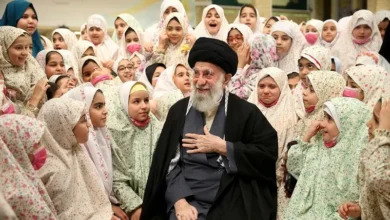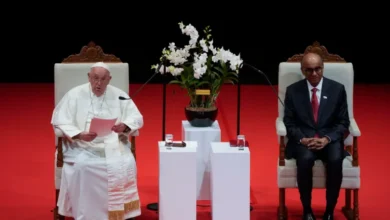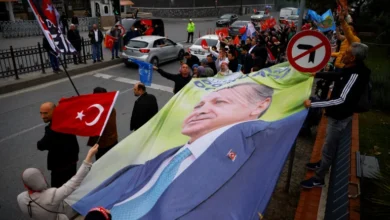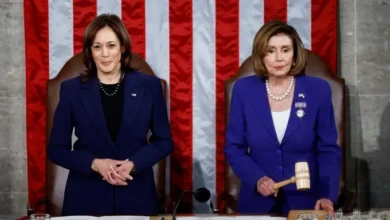Labor’s Albanese wins, Dutton concedes
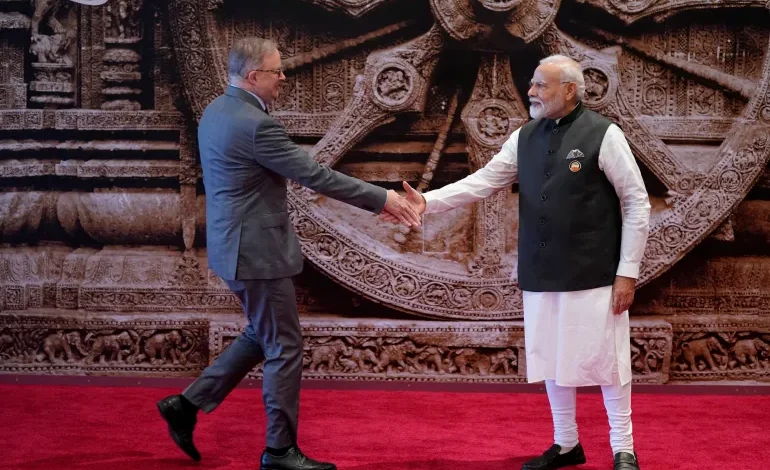
Anthony Albanese, leader of the Labor Party, has won re-election as prime minister of Australia in the country’s federal election.
Delivering a victory speech to supporters, Albanese says his party won a majority in the polls.India’s PM congratulates Albanese
Narendra Modi has congratulated his Australian counterpart, Anthony Albanese, on his election victory, saying it would strengthen ties between the nations.
In a post on X, Modi said he looked forward to working together to “further deepen” ties with Australia and “advance our shared vision for peace, stability and prosperity in the Indo-Pacific”.
“Congratulations on your resounding victory and re-election … This emphatic mandate indicates the enduring faith of the Australian people in your leadership”, Modi said.
India has deepened defence cooperation with Australia in recent years as part of the Quad alliance with the US and Japan, a grouping seen as a bulwark against China.
The two have enjoyed an amicable relationship. In 2023, Modi hosted Albanese in India, when they performed a lap of honour aboard a cricket-themed golf cart before a Test match, and bonded over their countries’ shared love of the sport.
Later that year, Albanese wooed Modi during a visit to Australia, referring to him as the “boss” during a large rally of Indian-Australians.‘Trump might have played a part but local, everyday issues hurt Dutton’
Daniel Stone, a former senior Labor strategist, says Albanese’s “incredible victory” was a “real turnaround”.
“Just in January, there was doubt about whether he’d be able to hold government,” he told Al Jazeera.
Stone said the Trump factor was likely to have a played a role in Labor’s strong showing, but he underlined the US president’s influence was not as definitive as in Canada’s election, “when there was a very direct cause and response” between his behaviour and the result.
“In Australia, I think what we’ve seen is the conservative leader Peter Dutton embraced some of the culture war, highly divisive and polarising tactics that Trump has popularised, and the Australian community sort of really turned its back on it,” he argued.
Stone largely put Dutton’s loss down to two “really local issues” that had all to do with people’s everyday experience.
“He tried to force civil servants to come back into the office, to stop working from home, and threatened to fire a number of them – something that landed really badly with the outer suburban young families” who are “really nervous” about inflation and the cost of living, he said, adding that people turned to Albanese for stability at a time when the world feels “a little bit more dangerous” and unpredictable.
“The second thing that he did that really undermined his claim was suggesting building nuclear power plants all over the country, even though Australia has no nuclear power plants, no nuclear industry, no experience building them – it would have taken 50 years and cost a huge sum of money to do, it just didn’t really add up,” Stone added.Latest seat projections
The website of the Australian Electoral Commission is projecting Labor would win 80 of 150 seats in the House of Representatives, with nearly 90 percent of polling places counted.
It gives 37 seats for the Liberal and National coalition, with 11 for independents.
As we’ve reported, ABC is projected 85 seats for Labor, with 41 for the Liberal and National coalition, nine for independents and another 15 too close to call.In other election news, Singapore’s governing party on course for win
We’re taking a quick break from our coverage of the Australian election to bring you some news from Singapore, where general elections have also been held.
The official vote count samples suggest that Singapore’s People’s Action Party (PAP) is on course for a decisive victory as it looks set to extend its unbroken six-decade rule of the city-state.
Voting samples in 15 of the 32 contested constituencies showed the PAP had won all but one of the races tracked, translating to more than a quarter of the house seats.
The election was a bellwether of the popularity of the PAP, which has ruled since before Singapore’s 1965 independence, with attention on whether the opposition can challenge the governing party’s tight grip on power and make further inroads after small but unprecedented gains in the last contest.
Though the PAP has consistently won in landslides with about 90 percent of seats, its share of the popular vote is closely watched as a measure of the strength of its mandate, with new premier Lawrence Wong eager to improve on the PAP’s 60.1 percent in the 2020 election – one of its worst performances on record.
The early vote counts released by the election commission were from random samples of 100 votes taken in each polling station, with a 4 percent margin of error.What was the era defined as the ‘revolving door’ of PMs?
Between 2010 and 2018, Australia gained a reputation for political turmoil, often described as the “revolving door of prime ministers”.
The country had five prime ministers in just eight years during this period, as Australia’s system allows party caucuses to change leaders mid-term.
Starting with Kevin Rudd’s ousting by Julia Gillard in 2010, the period saw constant party infighting and leadership spills.
Gillard was later replaced by Rudd in 2013, just months before a national election.
Tony Abbott won that election but was replaced by Malcolm Turnbull in 2015, who himself was overthrown by Scott Morrison in 2018.
In a 2018 interview, Albanese said that the turmoil offended the dignity of politics and “Of course, it has to stop”. In a 2025 interview with the Brisbane Times, the prime minister said he did not think that period had “served Australia well”.
